Ira L. Frost
Chapter 8
1940 – 1945
Leaving the Nest
The spring of 1940 saw the beginning of the children "leaving the nest", as this was the year Eunice graduated from High School. It was an important event for Ira, and a feeling of pride swelled up in him as he saw her walk down the aisle and receive her diploma. How fast time flew, as he could hardly realize when even the younger ones would follow the same path. Eunice was working out at various jobs to earn money so she could attend business college. A large share of her earnings came from assisting the Allreds' with their family. Vyla also had a chance to help with some of the family expenses by working at the potato processing plant in Burley. She put in many nights on the late shift and left the girls to do the house work, which was a good experience for them.
It was quite a milestone
and a happy occasion when, on March 10, 1941, the Frost family,
through the financial efforts of Ira, was able to have electricity
put in their home. The neighbors had all done this before, and
therefore, it was an event which had been discussed and long awaited
by all the family. After the years of kerosene lamps, flat irons
heated on the stove, ice boxes with blocks of ice, the electricity
was really appreciated. The little bare light globes hanging from a
wire with a chain pull was a lovely sight to behold and that evening,
the children could hardly wait for darkness so they could try the
lights. It was one wild and noisy bunch of kids who ran all around
the circle of the house, from the old front porch into the kitchen,
then into the front room and back to the old porch again, turning the
lights on and off as they laughed and had a happy time.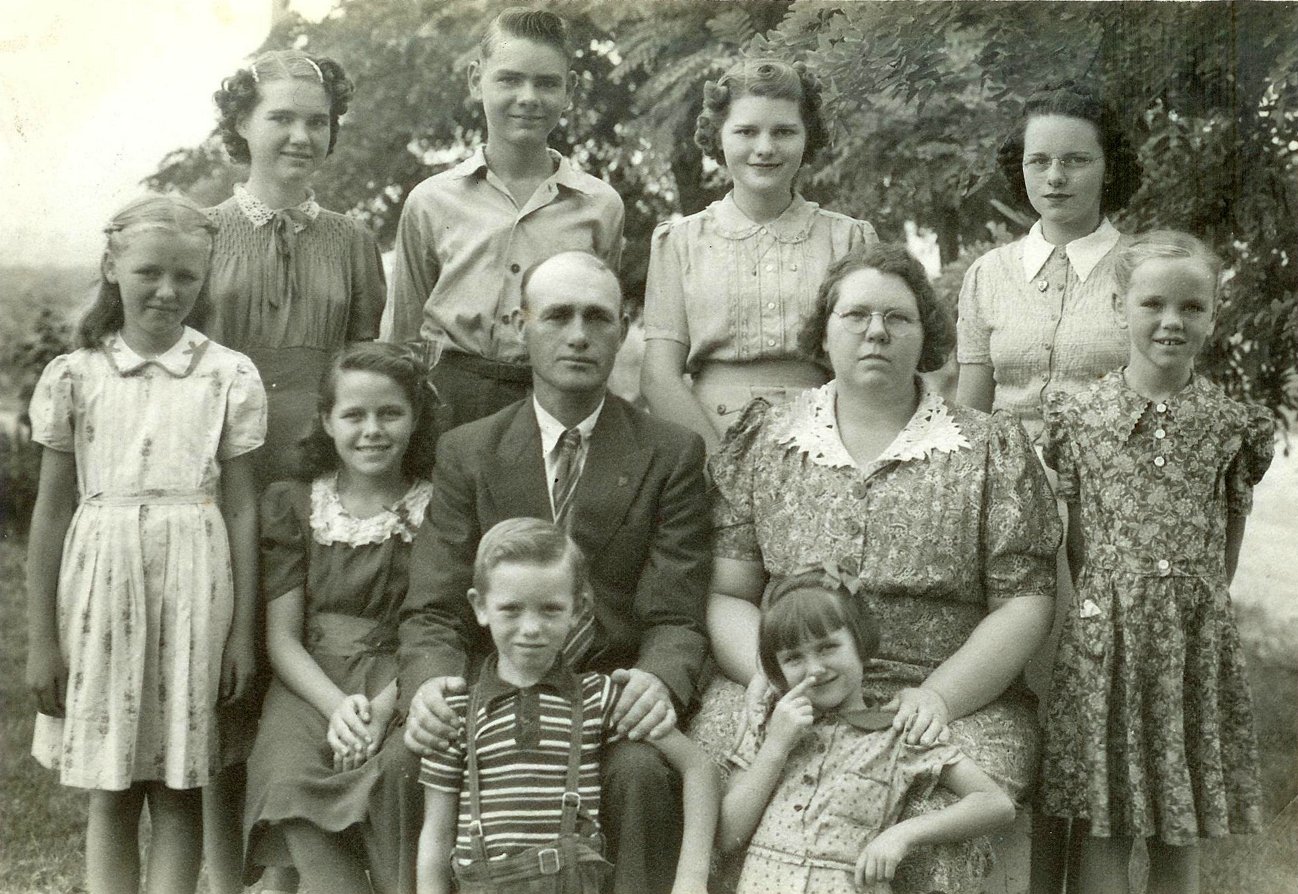
The Frost Family in 1940 just before Eunice left home for business college.
Back: Celia, Myron, Eunice, and Thelma. Middle: Marion, Lorna, Ira, Vyla, and
Irma. Front: Gerald and Kathryn.
Thelma graduated from High School in May and she had great plans for working and getting out on her own. The farming work proceeded with the usual "happy" crew of Frost kids out in the beet field with their short handled hoes, crawling along or walking, their backs bent, with one intent in mind: getting the beets done! An airplane landing in the field across the road brought a little excitement to an otherwise dull summer day. It made a forced landing and then pulled out into the beet field and took off again.
In October, Vyla started
working at the potato mill again. They needed electrical appliances
and one main item they all wanted. . . was a radio. They bought a
used one with a short wave from Ira's brother, Earl. Lots of happy
evenings were spent with the kids crouched on the floor in front of
that old floor model radio listening to such programs as "Henry
Alldrich", "Fibber McGee and Molly", "Inner
Sanctum Mystery" and Ira sometimes listening to the police calls
on the short wave. Prior to getting the radio, Ira would always go up
to Gooch's to listen to Joe Lewis's Heavy Weight Championship fights
on the radio. Now, the Frosts were really living it up.

The old gray Studebaker. One of the nicer
cars Ira owned
However, Eunice was a little too late to enjoy these modern conveniences, as Ira and Vyla took her to Salt Lake City in August and left her to stay at the home of George Wood, an elder they had known in Moscow. She did some housework and then started at L.D.S. Business College.
This was the fall they were able to buy Myron his first suit. Also the pet goat must have been a nuisance, as he notes in the diary, they had to butcher it. And, after all the years of the big family being crowded into the small three room house, the time had come to add an addition. Ira bought some lumber in December and started this project. The plans were for a new porch, kitchen and bedroom with a portion to be used as a future bathroom. This was all to be built onto the west side of the house.
While in the process of working on the house, Vyla and Thelma working at the potato mill, Eunice making frequent visits home, and the other children busy with school activities, the sad news came of the attack on Pearl Harbor by the Japanese. Our beloved country was at war again. It was not long until the people of the nation and the Frost family learned the meaning of patriotism and love of country. December 7, 1941 would not be forgot.
Ira worked on the house
all during January and February of 1942, and although not quite
finished, the family moved into the new addition on March 7. Vyla's
brother, Myrl, helped with the cupboards and the finish work. Then
came the spring and summer work. Myron had a job at Raft River
working on a ranch and Thelma went to Salt Lake City where she
attended business school and worked.
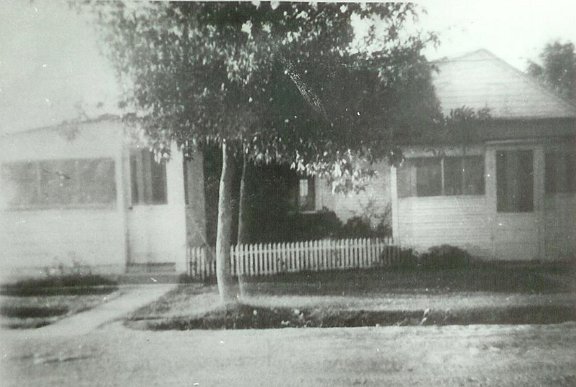
The farm house after the addition
Vyla's winter earnings provided a much needed refrigerator. That fall Myron gave Ira his earnings to help pay for an eye examination and glasses which he needed. He had a difficult time adjusting to them. In his diary he wrote: "having hard time with glasses. . everything slopes to right. They threw me off pig pen into a pool of water. . . fall when stepping off fences or ditch banks." The rest of 1942 Ira was building a corral with railroad ties and started on a new chicken house.
The beets were harvested with the help of the family. Topping the beets by hand with a sharp beet knife, throwing them into rows, and then throwing them onto the truck as it drove between the rows was a real tiring job.
During the war, with shortages of help, the schools had extra long harvest vacations, and the kids all worked picking up spuds and in the beets. Ira worked at the sugar factory that winter, working from 12:00 midnight till 8:00 a.m. and Vyla was on the 1:00 p.m. till 11:00 p.m. shift. Christmas was nice with the sisters coming from Salt Lake City. The other kids were excited to have them come walking up the road after getting off the bus down on the highway. Sometimes they would come in the middle of the night, surprising the family. It was not unusual to wake up finding one of them in bed with the other kids.
Early in 1943 Ira had
some health problems, suffering with neuritis and was unable to do
very much that winter. He did manage to finish the house and the
chicken coop. Then, much to the delight of the girls, Ira converted
what had been the kitchen into two bedrooms by adding a wall. Oh,
what a way to live to actually have a room that two or three could
call their own. In the earlier years the sleeping arrangements of the
family was almost wall to wall beds. In the tiny bedroom there were
at times, bunk beds. . .pull-out beds. . .and a crib for two babies
at a time. In the front room was the old davenport which, when
unfolded at night, took up most of the room and was dangerously close
to the stove. Three of the girls slept there. In the summer a cot or
two was placed out on the old porch for sleeping and on many summer
nights Myron slept outside.
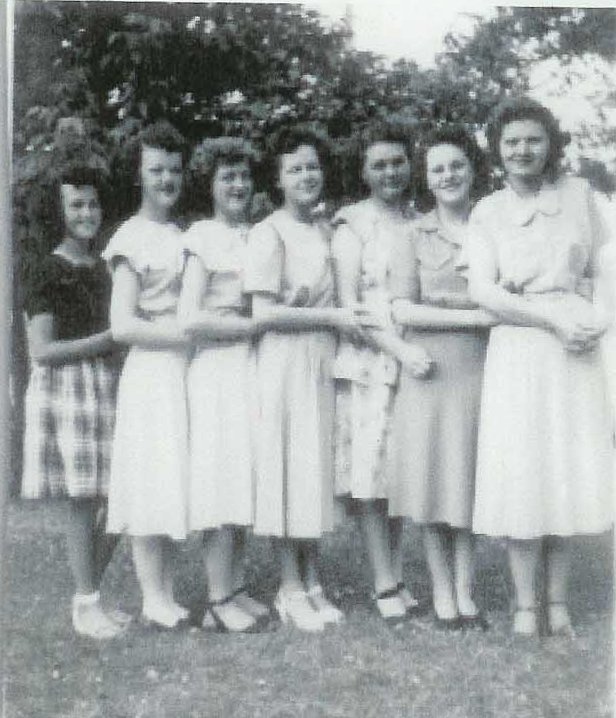
The seven Frost girls: Kathryn,
Irma, Marion, Lorna Celia,
Thelma, and Eunice
On one of those summer evenings, Marian had slipped out to the old outhouse and then came back in again without the others knowing she had left. It was dark and with everybody just getting to sleep, the sound of the door opening and someone coming in frightened Eunice and Celia into thinking an intruder was there. They went screaming to their dad. Ira fumbled for a weapon. Then finding no intruder, he quizzed the family until he discovered the truth. It created quite an amusing incident which they laughed about later. Thinking back on some of these events, it is no wonder the new bedrooms were such a welcome addition.
The summer of 1943 Myron worked at Raft River while the rest of the family carried on with the regular farm work. The war was in full swing and Vyla and some of the girls rolled bandages to help the Red Cross. The family was issued ration books which were used to buy the shoes, sugar, meat, gasoline, tires and other scarce items. There was a scarcity of many commodities. When Penney's received a shipment of overalls or fabric, Vyla would take the kids to join others in the purchase line. In July of that year, Dad Dayley passed away.
The grain harvest was
one of the highlights of the summer for the children. Oh, the
anticipation as they helped their mother bake pies and prepare a big
meal for the crew. When they finally got a glimpse of the threshing
machine as it thundered down the road, they joyfully ran out to meet
it. Following closely behind or ahead would be several teams of
horses pulling the hay wagons and a crew of the men ready to work. As
soon as the big machine was set, the work started. The men pitched
the shocks of grain from the field onto the wagons, which hauled the
loads into the threshing machine where the grain was pitched into it.
The exciting result was grain coming from the spout where it was
sacked, and the straw coming from the big blower made a beautiful
stack of straw. Oh the tunnels that they could build in the stacks.
Oh...the itching arms and legs that resulted. At mealtime the whole
crew came to eat. There was always a wash tub the kids had set up
with water, soap and towels where the men could wash up. The children
all had to help with setting the table and other tasks. At times,
Mother Dayley came to help out.
Ira bought his first truck about
this time. It was a welcome piece of equipment, often needing
repairs, but proved to be of great value in the harvest. After the
harvest, Vyla again went to work.

Myron driving the old beet truck. Tootles, the dog is
following along.
Due to the draft with all the young men being taken into the Army on their eighteenth birthday, Myron decided to enter the service. He was not yet eighteen and thought he could have the draft board make it possible for some married man to stay home if he took his place. On November 4, 1943, he went to Twin Falls where he joined the Navy. On November 18 the family bade him goodby and he left for his training. Ira writes in his diary: "Everywhere I turn there is something to remind me of our boy. I feel confident he is well enough grounded in the church that he will come back as clean as he leaves us . . . not because he is my boy because I have not done anything to claim the honor of his high moral standing." However, Ira was very much the reason, along with his wife, for the kind of boy Myron was. From years back there were nights sitting around a warm stove eating popcorn with Ira reading to the children and discussing Gospel principles. Ira was practicing Family Home Evening long before it was presented as a program by the church.
By the beginning of 1944 many things had changed in the Frost's big family with Eunice, Thelma and Myron away from home. Letters from them was always a welcome message. On January 13th it was exciting when Myron came home on leave sporting his crew hair cut and his Navy uniform. The girls from Salt Lake City came home and for a brief week-end, they were all in the security of the family circle one more time. Myron left for Farragut, Idaho on the bus on January 26th. Ira did a few more things on the house until it was time for the spring planting.
In May, Myron came home
on leave just in time to graduate from Seminary with his classmates.
He had been taking a correspondence course through Brother Allred. He
was asked to give the benediction for the Seminary Graduation
exercises. His leave was a short one, and about the time he left,
Celia moved into town where she was working. Now almost half of the
family had gone. . . They all made frequent visits home and Ira was
always happy whenever they did.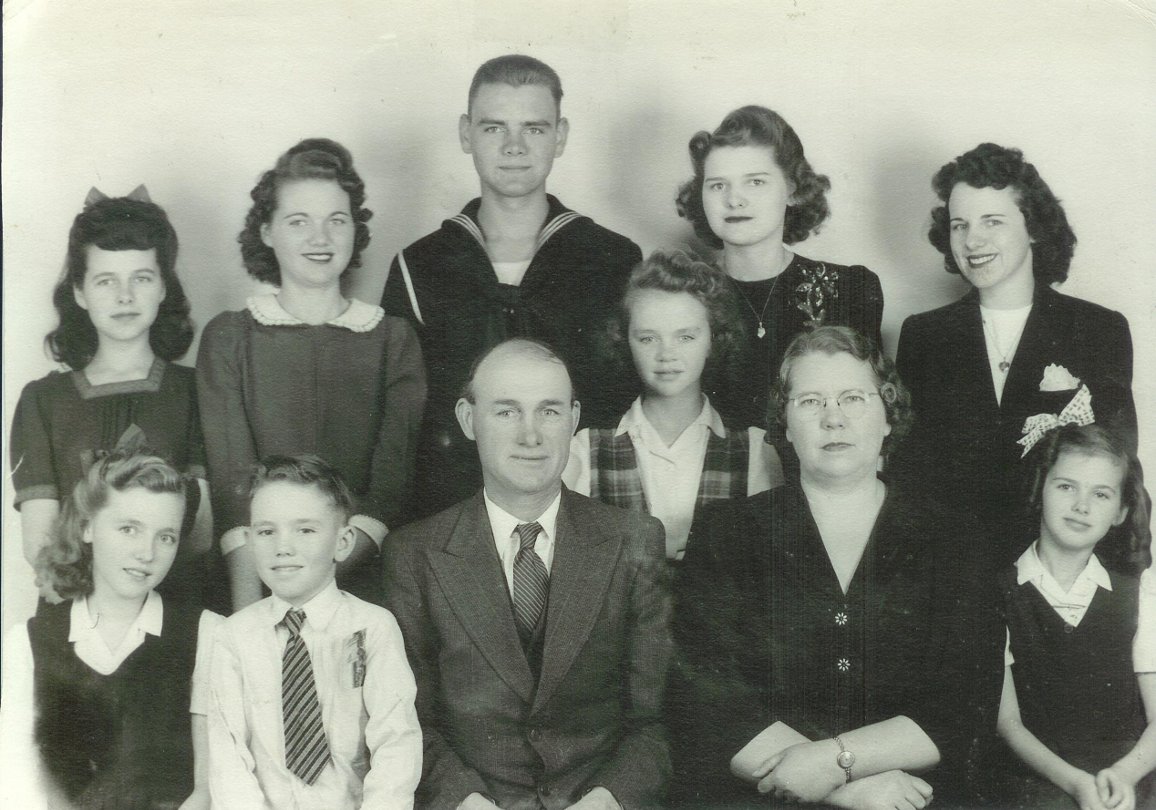
The Frost Family - January 1944. Back: Lorna, Celia, Myron, Eunice,
and Thelma. Front: Marian, Gerald, Ira, Irma, Vyla, and Kathryn.
This was the summer that Kathryn was riding Old Prince and fell off, breaking her arm. Other than having fewer children at home, the summer was typical with happy events like family reunions, freezers of home made ice cream, the ritual of moving out of the house for a day while it was fumigated for pests, swims in the canal, and sewing school clothes.
One day to look forward to each summer was the arrival in the mail of the new Sears catalog. Catalogs were given special respect in those days, and even Ira would sit and look at it and call it the "wish book". Much of the family shopping was done through the mail order, and what a lot of fun when the mail man delivered a package. The catalog was well worn by the time the one next season arrived; however, it was put to good use it was used as the "bathroom tissue" in those days. The nice soft index pages were the first to be used, then the black and white, and last the stiff colored pages. By that time they were hoping for another catatog!! One day when Vyla was feeling prosperous, she bought a roll of bathroom tissue, which caused some of the Gooch family to comment on how extravagant she was.
On July 13, Myron had another leave after graduating from gunnery school. He helped furrow out the potatoes and other jobs around the farm, and liked being able to help again. He went to a dance and a couple of shows with his girlfriend and was always so good to let the teenage sisters tag along as they had done so many times before. It was with regret that the family took him to the bus depot to bid him farewell, knowing that he would probably be sent overseas. Our country was really involved in the war by now with an all out effort on the part of the fighting forces. Many loved ones were bidding their boys tearful good byes not knowing if they would ever see them again.
Ira had other pleasant
events to think about and help ease the parting of his son. This same
day, July 19, 1944, Ira and Vyla left for Logan to meet Thelma and
her fiance, Jay Jackson. They were married the next day. This was the
beginning of Ira's family increasing with the gaining of a new son.
Jay was also in the service, and they left for California soon after
an outdoor reception was held for them at the family home. On Ira's
birthday that year, the notation in his diary was: "Another big
day in my life never to be again as I had reached my fifty-third
birthday. . . Afraid I'll never pull through that many more, but
would like a glimpse of the times fifty years hence and see what
progress will have been attained " Shortly after that, he
mentioned going to Trapper Creek where he caught a nice bunch of
fish.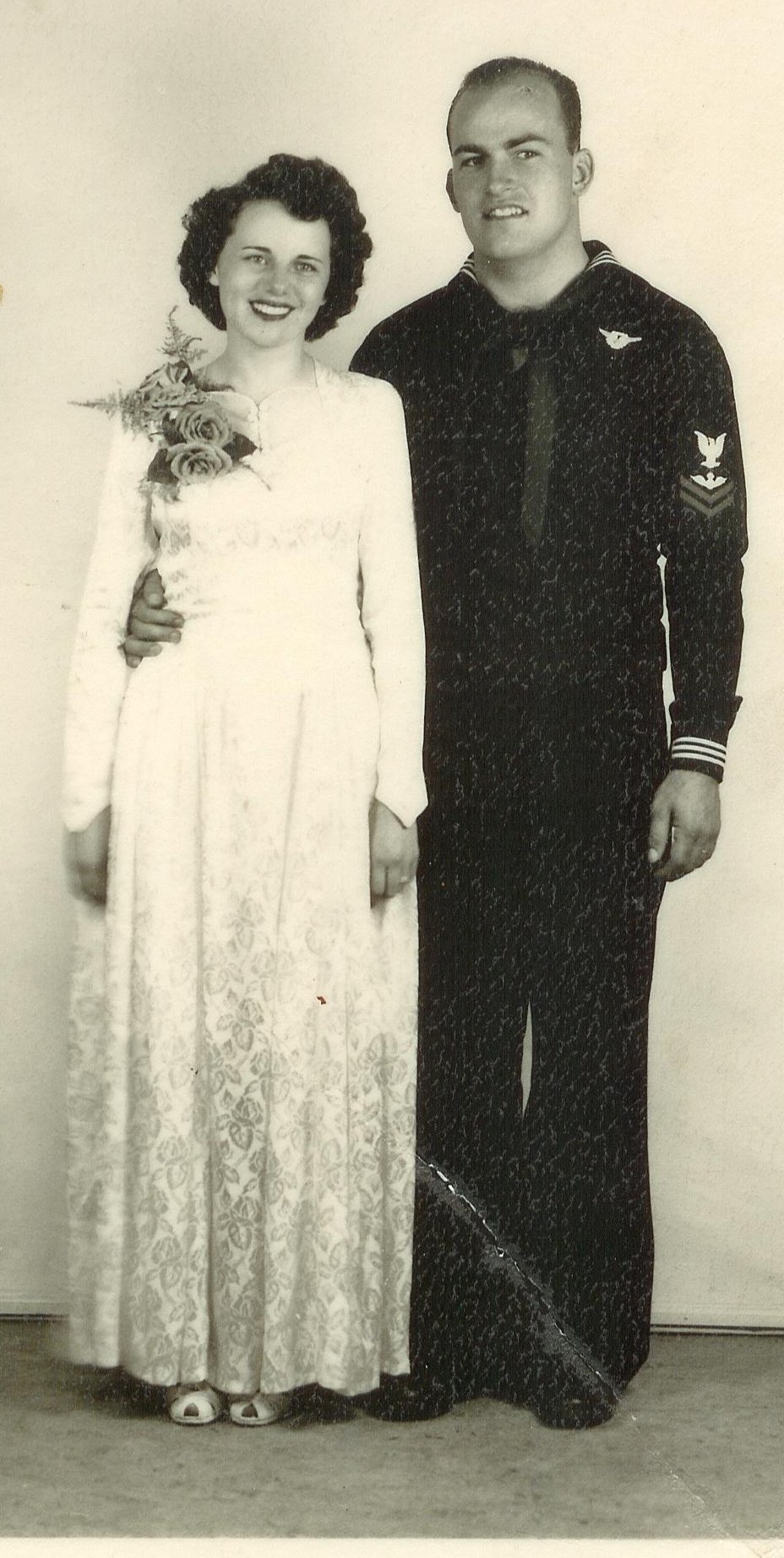
Thelma and Jay
20 July 1944
Harvest time that fall was completely done by work being traded between them and the Gooch family. In November another great improvement for the family was a reality with Ira doing the hard work of digging a pit for installing a water system. At last on November 23, 1944, there was running water in the house and to the corrals for the cattle. He installed a kitchen sink and another small wash basin in the corner of the kitchen. The tiresome chore of pumping water by hand was now at an end.
A little later the shower was added, and one more of the old traditions, the old galvanized bath tub, was tossed aside. Many a time, it had been brought in, put behind a make-shift curtain divider, filled with water heated on the stove, then plunged into by an assortment of dirty kids. Until the children were old enough to carry and heat their own water, three or four had to take their turn bathing in the same water. It was still a little later before the toilet was added and the bathroom completed. When it eventually was, Ira felt that surely he had about every luxury he would ever want.
As an extra bonus gift for themselves, they paid off the mortgage on the farm in November. The contract allowed them thirty years in which to pay, but through hard work and budgeting, the farm was now theirs. This added to their Christmas joy and the end of the year 1944.
Had Ira known the events
happening half way around the world those few days before Christmas,
it would certainly have been a sad holiday. Quite a few letters had
been arriving from Myron and they were cherished, read and re-read.
On January 5, 1945, Myron's twentieth birthday, Ira noted in his
diary that he wrote a letter to Myron. On January 12, Mr. Gooch noted
an item in the Twin Falls newspaper which was a shock for all. He ran
to the Frosts with the news item reporting of three destroyers
capsizing in a typhoon just off the island of Luzon on December 18.
One of the destroyers was the Spence; Myron's ship! The report was
that there were twenty-two 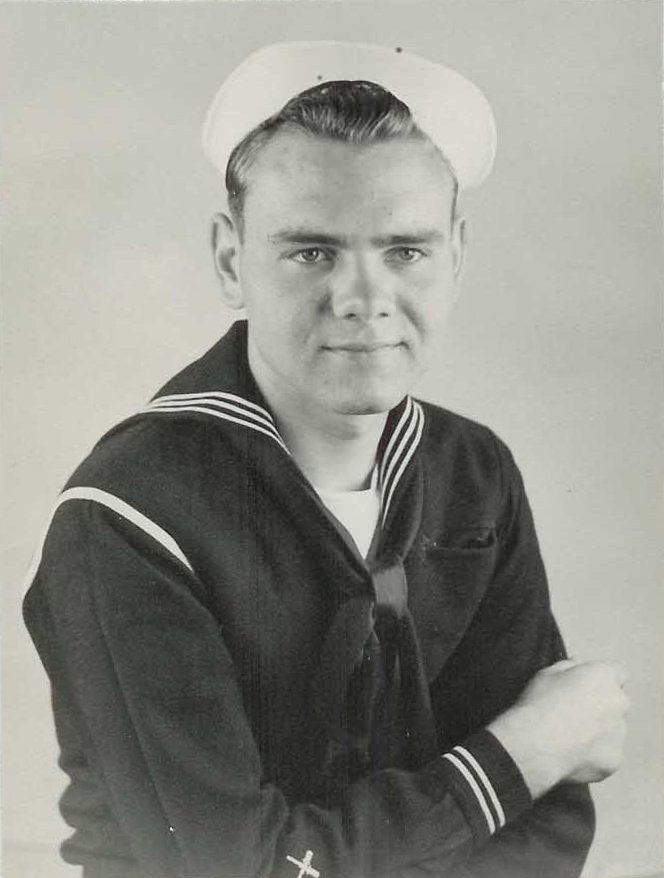
Myron
survivors. Through the anxious hours,
Ira and the family were praying and had faith that he might be one of
the survivors. It was on Monday, January 15th,
that the dreaded telegram arrived, saying that Myron was missing.
Even though it was expected, it was still a big shock getting the
news.
Ira's diary entries for the next few days were as follows: "Has been too sad a week to do anything, the saddest news of our short married life, but thank God if he has gone to his maker he has gone clean and pure as they get them. We still hope for a letter from or of him..." And on January 20th, Just a sad day, sat around and grieved but gradually became a little more reconciled." February 4th: ....Went to Sunday School and Sacrament meeting, fixed Myron's bike up for Gerald . . . Had blues . . . walked around the farm . . . everyplace I went I could see Myron in years past, on his bike, in the fields, which made matters worse..... ...Mother was as blue as I and that made things still worse. Through prayer I seem to get relief from my unhappiness."
On February 8th another telegram arrived stating there was no possibility that Myron had survived. A beautiful Memorial service was held in his honor on March 11th at the Burley Stake House. Ira describes it as follows: "Vocal selection, 'Someday We'll Understand' by a mixed chorus, the prayer was by Ezra Bingham. A duet sung by Nona and Barbara Morrison, the life sketch by Wilson Warner, a talk by L. E. Harris and also Wallace Baker. Gene Price sang, 'Sleep, Sailor, Sleep', followed by a talk by Elwood Allred and Adonis Nielson led the congregation in the salute to the flag. The American Legion conducted a military ceremony before the services. Bishop LeRoy Crane gave a few remarks, followed by a chorus singing, 'My Future Home' and the prayer by Morris Baker. Nothing could have been done or said to make the services better than they were. All spoke wonderfully of him and without exaggeration." The girl he had dated before he left told Ira that Myron had told her that he wasn't afraid to die and also that he had not tasted liquor or used tobacco. All of these things helped to console Ira in his grief. The blue star in the window indicating a son in the service was exchanged for a gold star to show that a son had given his life for his country.
Many families experienced similar losses, so the surrender of Germany in May 1945 was the most welcome news of the times. In late August the war in the Pacific was over and it was a time for great rejoicing. The lives of many people had been given for their country. Though a solemn occasion, it was also a time to celebrate, so Ira let Celia take the car to town with the other kids to join the crowds driving up and down the streets honking their horns.
Chapter 9